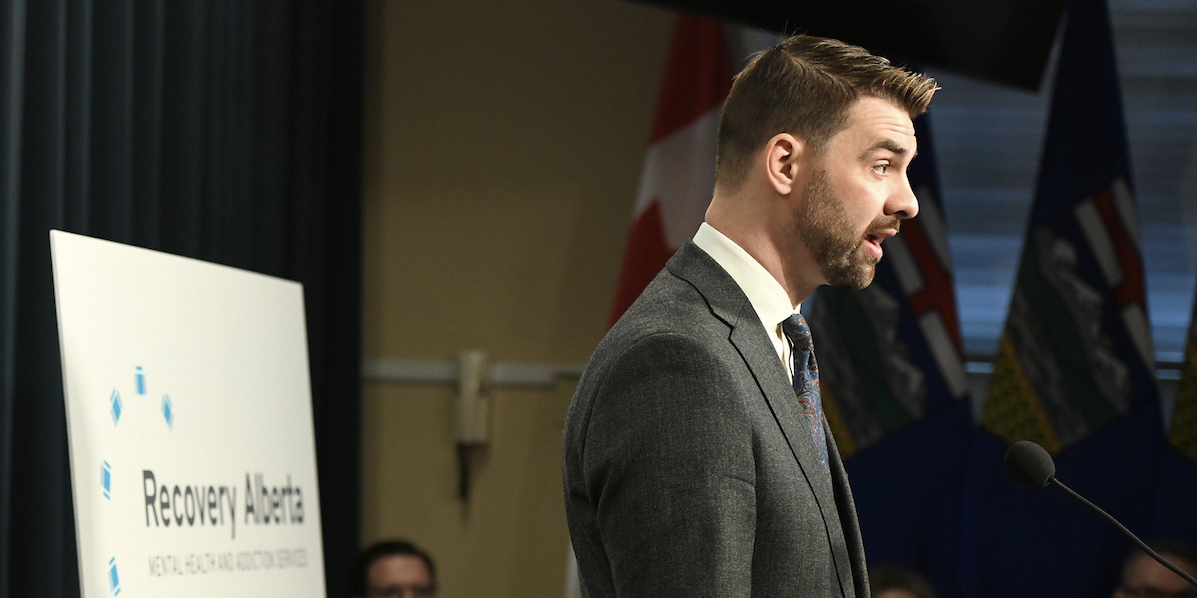About 10,000 Alberta union nurses will be transferred from Alberta Health Services (AHS) to Recovery Alberta without recognizing employee contract rights. The move would affect an estimate of 3,200 United Nurses of Alberta (UNA) members—and in response, UNA filed an unfair labour practice complaint on April 8.
After months of uncertainty around the Alberta government’s plan to refocus healthcare, UNA and other labour unions that represent AHS workers were caught by surprise earlier this month on April 2. UNA was informed of the transfer of thousands of nurses to Recovery Alberta, the new mental health and addictions organization, at the same time it was announced to the public.
“In November 2023, when the government announced these new organizations, [healthcare unions] had a meeting with the Minister of Health where we were clearly told that these organizations would not be the employer,” said Heather Smith, president of UNA, in an interview with rabble.ca.
The complaint submitted to the Alberta Labour Relations Board cited bad faith bargaining and an interference with the union’s representation of its members—this took place while negotiations for a new Provincial Collective Agreement were underway.
Although both parties commenced bargaining on February 6, with several meetings taking place, AHS failed to inform UNA on the restructuring of services provided by AHS and other healthcare organizations before the April 2 announcement.
“They had a legal obligation to inform unions and to bring that information to the bargaining table … and until the government announcement, there was not a peep about this,” said Smith.
The complaint stated that the provincial government claimed that the plan for Recovery Alberta was done in collaboration with AHS and front-line workers. But there was no consultation, information shared or bargaining that occurred with UNA, regarding the transition.
READ MORE: AB drug treatment strategy ideologically driven
“David Harrigan, [UNA’s director of labour relations], has a good phrase for it—we’re not the NHL or a football team. You can’t just tell people, go play for another team,” said Smith.
In UNA’s collective agreement, they have what’s called the Letter of Understanding #4 (LOU 4) which outlined what should occur in the event of an employer change.
“Employees have the right to decide whether they go or not. If they decide they do not want to go, then they have rights under our contract in terms of layoffs and recalls—so it’s not a done deal,” said Smith.
When a service has been transferred, or in other words if there is a change of employer, employees are entitled to rights outlined in the LOU 4.
LOU #4 clearly stated that if services are moved between bargaining units, or in other words if there is a change of employer, parties will need to meet to discuss implications for employees in those services.
UNA’s labour complaint stated: “AHS has not sought any change in the current round of bargaining concerning LOU 4 or the article concerning layoff and recall rights or process.”
Undercutting unions role in the collective bargaining process
Along with the bargaining in bad faith, UNA alleged AHS interference with their representation of members. AHS communicated directly with employees about the transfer to Recovery Alberta before any negotiations took place—failing to recognize the UNA as the bargaining agent.
The complaint stated that this ultimately undermined the unions’ bargaining role, interfering with their ability to represent members.
“They’re wrong in saying that employees must transfer and they have failed to make any effort to negotiate provisions for employees’ rights to bargain. In fact, they’re continuing to bargain directly with employees by telling them they have no choice but to go,” said Smith.
Adding that the AHS and the provincial government’s misinformation on the transfer to Recovery Alberta to employees subverted the collective bargaining agreement.
“We attempted to have that misinformation corrected … in fact, it was not corrected, but later on in the week it was restated to employees that they would all be going to Recovery Alberta,” said Smith.
According to the Alberta government press release on April 2, Recovery Alberta timelines depend on if legislative amendments will be introduced. By June 3, the Ministry of Mental Health and Addiction plans to establish the corporate structure of the new organization. Then on July 1, staff and services would begin operating under Recovery Alberta.
UNA called for immediate corrections to AHS’s statement, but their response remained ambiguous.
“We asked them to correct it [and] to tell employees that they in fact, had options, which they refused to do. We asked them if they would recognize and respect our LOU 4. Basically the only answers we got back— and not directly, it was through email—was that until there’s legislation, which isn’t expected until June, they can’t answer our specific questions,” said Smith.
“That’s why we had to go to the Labour Relations Board with a complaint of bargaining in bad faith,” Smith added.
As a result of AHS’ actions, UNA is seeking several remedies including a declaration that they are in violation of the Labour Relations Code, and cease and desist in violating it, an order to bargain in good faith, ceasing direct communication with employees regarding any transfer to Recovery Alberta and more.



